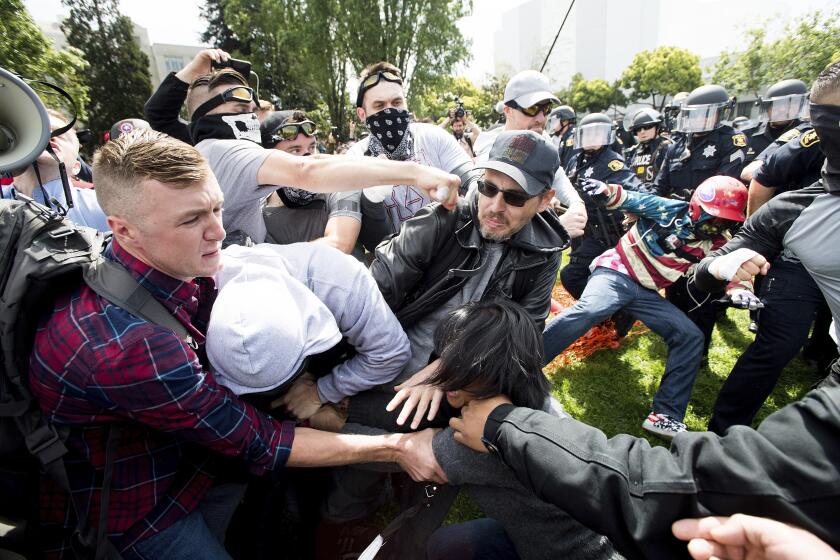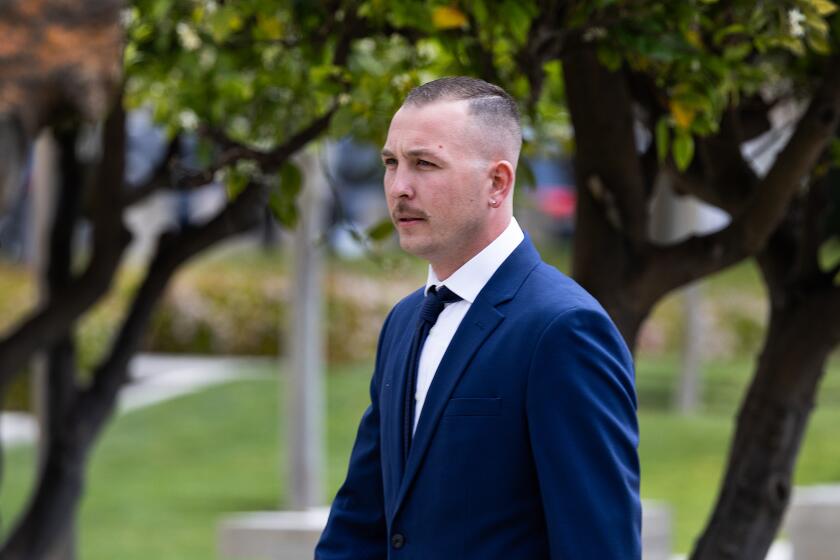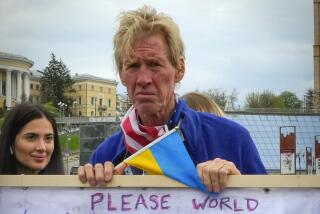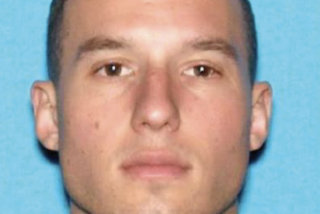Bail possible for accused white supremacist leader after ruling by O.C. federal judge

In the latest twist in a legal saga that’s dragged on for nearly six years, a federal judge in Orange County granted bail Tuesday to the accused founder of a violent white supremacist group — but the order will not take effect for at least four days pending a review by a higher court.
During a hearing that lasted more than an hour, U.S. District Judge Cormac J. Carney questioned the government’s use of resources on the case before granting bail to Robert Rundo, who spent nearly a year as a fugitive until he was extradited from Romania last year to face conspiracy and rioting charges.
Carney has twice dismissed the government’s case against Rundo and other members of a now-defunct white supremacist group known as the Rise Above Movement, or RAM. The judge has stated that Rundo and others were being selectively prosecuted, while “far-left extremist groups” were not.
“I understand international, dangerous people, and with all due respect to Mr. Rundo, he was a knucklehead who was misguided,” Carney said on Tuesday. “This is not the felony of the century. I don’t have any evidence that anyone was seriously hurt, even Antifa, let alone innocent civilians.”
After Carney dismissed charges against Rundo in February, Rundo was released for a short time over objections from prosecutors, who appealed the decision. Rundo was taken back into custody in San Diego County.
The 9th U.S. Circuit Court of Appeals later ruled that any district court decision to release Rundo be automatically stayed for at least four days.
In his decision, a judge agreed that the alleged white nationalists were being selectively prosecuted instead of ‘far-left extremist groups, such as Antifa.’
In a written order Tuesday, Carney called the prosecution’s conduct in the case “quite troubling” and said the government “just does not seem to care about the Constitution.”
“We are prosecuting individuals associated with a militant white-supremacy organization,” U.S. Atty. Martin Estrada said in a statement after the hearing. “As federal prosecutors, we do everything we can to protect our community, and we do so ethically and in conformity with the Constitution.”
In court, Assistant U.S. Atty. Solomon Kim described Rundo, dressed in a white jail uniform, as “an international fugitive who has evaded law enforcement systematically and repeatedly over the years.” He said Rundo had traveled to at least seven countries, booked more than a dozen flights and assumed different aliases as part of that effort.
In a written opposition to Rundo’s request for bail, prosecutors described him as “dangerous and violent,” citing a 2010 case where Rundo was sentenced to two years in prison for repeatedly stabbing a person.
“Regardless of what this court or defense counsel may believe related to whether or not the defendant was selectively prosecuted, that does not change the fact of the defendant’s flight and the danger that he poses to the community,” Kim said.
Inside Rundo’s Huntington Beach home, which he shared with a fellow Nazi sympathizer, prosecutors said, he kept Nazi paraphernalia, including “drawings of swastikas and a Nazi eagle ornament” in his bedroom and “a framed portrait of Adolf Hitler in the living room.”
The case against Rundo dates to 2018, when he and three others were charged with violating federal conspiracy and riot statutes tied to their activities with the Rise Above Movement. A federal indictment alleged that Rundo and other defendants recruited new members to the organization, coordinated training in hand-to-hand combat and traveled to political rallies to attack protesters at events across the state.
The indictment alleged that members participated in attacks at political rallies in Huntington Beach on March 25, 2017; in Berkeley on April 15, 2017; and in San Bernardino on June 10, 2017. Afterward, they allegedly trained for events and celebrated by posting photos online of RAM members assaulting people.
Tyler Laube pleaded guilty last year to a misdemeanor count tied to his involvement in the Rise Above Movement, a Southern California white supremacist group.
Rundo was accused of organizing the violent confrontations and attacking protesters and police officers. After Rundo was ordered by police to stop attacking a “defenseless person” during the Berkeley protest, he allegedly punched an officer twice in the head, according to an arrest warrant.
In his written order, Carney said Rundo and other defendants were “not the true threat to democracy at the rallies,” instead blaming the antifascist movement known as Antifa.
“Antifa, not Mr. Rundo and his co-defendants, went to the rallies to shut them down by demeaning, pepper spraying, assaulting and injuring the people in attendance,” Carney wrote. “Mr. Rundo and his co-defendants’ clear purpose in attending the rallies, on the other hand, was to battle Antifa and prevent Antifa from hurting the people in attendance.”
During the Tuesday hearing, Carney questioned whether Kim believed they would “get 12 people in Orange County to unanimously agree that Mr. Rundo and three other people conspired to commit violence against innocent counterprotesters.”
“We do,” Kim said.
“I’ve been doing this — lawyer and judge — for 36 years, and my sense is Orange County people do not like Antifa demeaning disabled veterans, they do not like them desecrating our flag, they do not like them pepper spraying middle-aged women who are just arguing what they believe,” Carney said. “I think you’re going to have a problem.”
More to Read
Sign up for Essential California
The most important California stories and recommendations in your inbox every morning.
You may occasionally receive promotional content from the Los Angeles Times.













